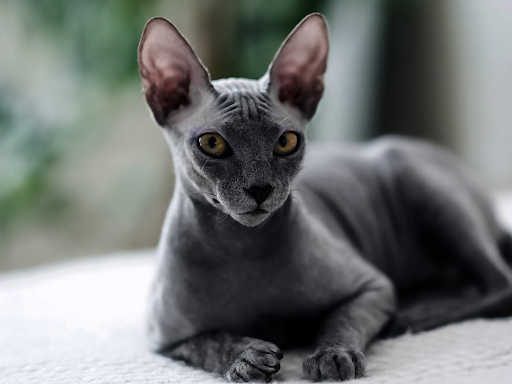Sphynx kittens are among the most unique and striking cats, known for their hairless appearance, large ears, and affectionate nature. Despite their lack of fur, sphynx kittens require a high level of care to ensure they grow into healthy and happy adults. From skin care to socialization, their needs are quite specific and deserve careful attention. This article delves into the essentials of caring for Sphynx kittens to help new owners provide the best possible start for their feline friends.
Understanding the sphynx kitten
The sphynx breed originated in Canada in the 1960s as a result of a natural genetic mutation. These kittens are known for their playful and loving personalities, often forming strong bonds with their human families. They are also highly social and thrive in environments where they receive plenty of attention.
While they are often referred to as “hairless,” sphynx kittens for sale typically have a fine layer of downy fuzz that gives their skin a velvety texture. However, their lack of a protective fur coat means they have unique needs that differ significantly from other cat breeds.
Skin care
One of the most critical aspects of Sphynx kitten care is managing their sensitive skin. Without fur to absorb natural oils, their skin can become oily and prone to issues such as acne.
- Regular baths: Bathe your sphynx kitten weekly with a gentle, hypoallergenic cat shampoo. Use lukewarm water and ensure you rinse thoroughly to avoid leaving any residue, which could irritate their skin.
- Moisturizing: If their skin becomes dry, consult your veterinarian about using a cat-safe moisturizer. Avoid human products, as they can be harmful to kittens.
- Cleaning wrinkles: Pay extra attention to the folds and wrinkles on their body, particularly around the neck, legs, and tail. Use a soft, damp cloth to clean these areas gently to prevent buildup of dirt or bacteria.
- Sun protection: Sphynx kittens are prone to sunburn due to their lack of fur. Limit their exposure to direct sunlight and consider using a vet-approved pet sunscreen if they spend time near windows or outdoors.
Temperature regulation
Without a fur coat, sphynx kittens are sensitive to temperature changes and can quickly become too cold or too warm.
- Provide warmth: Keep your home at a consistent, comfortable temperature. Consider providing heated pet beds, soft blankets, or cat-safe heating pads to ensure your kitten stays warm.
- Seasonal clothing: In colder months, a soft, well-fitted sweater can help your sphynx kitten maintain body heat. Ensure it’s made of breathable material to avoid skin irritation.
- Avoid overheating: During warmer months, ensure they have access to cool, shaded areas and fresh water. Avoid leaving them in direct sunlight for extended periods.
Diet and nutrition
Sphynx kittens https://www.kittensup4sale.com/ have high metabolisms to help regulate their body temperature, so they need a nutritious and calorie-rich diet.
- High-quality food: Choose a premium kitten food that provides a balance of protein, fats, and essential nutrients. Wet food can be a great addition to their diet to ensure they stay hydrated.
- Frequent feeding: Feed your sphynx kitten smaller meals throughout the day rather than one or two large meals. This helps maintain their energy levels and supports healthy growth.
- Monitor weight: Keep an eye on their weight to ensure they are neither underfed nor overfed. Consult your veterinarian if you’re unsure about portion sizes.
Grooming and hygiene
Although sphynx kittens don’t shed fur, they still require regular grooming to stay clean and healthy.
- Ear cleaning: Sphynx kittens’ ears can accumulate wax and dirt more quickly than other breeds. Clean their ears weekly with a vet-approved solution and cotton balls or pads.
- Nail trimming: Trim their nails every two weeks to prevent overgrowth and scratching. Use cat-specific nail clippers and ensure you’re cutting only the transparent tip to avoid hitting the quick.
- Eye care: Their large, open eyes are prone to debris and tear staining. Gently clean the area around their eyes with a damp cloth or a vet-recommended eye wipe.
Socialization and mental stimulation
Sphynx kittens are highly social and thrive in environments where they receive plenty of interaction and mental stimulation.
- Playtime: Engage your kitten with interactive toys such as feather wands, puzzle feeders, and laser pointers. This helps satisfy their curiosity and provides necessary exercise.
- Companionship: Sphynx kittens dislike being left alone for long periods. If possible, consider adopting another cat to keep them company or ensure someone is available to interact with them regularly.
- Training: Sphynx kittens are intelligent and can be trained to perform simple commands or use a scratching post. Positive reinforcement with treats and praise works best.
Litter box training
Proper litter box habits are essential for any kitten, and Sphynx kittens are no exception.
- Choose the right box: Use a litter box with low sides to make it easy for your kitten to enter and exit.
- Litter type: Select a non-scented, clumping litter to minimize irritation to their sensitive paws.
- Cleanliness: Scoop the litter box daily and change the litter entirely at least once a week. Sphynx kittens are meticulous and may refuse to use a dirty box.
Regular veterinary care
Routine veterinary care is essential to monitor your Sphynx kitten’s health and address any potential issues early.
- Vaccinations: Ensure your kitten receives all recommended vaccinations to protect against common feline diseases.
- Spaying/neutering: Discuss the appropriate timing for spaying or neutering your kitten with your veterinarian.
- Health screenings: Sphynx kittens are prone to certain genetic conditions, such as hypertrophic cardiomyopathy (HCM). Regular check-ups can help detect and manage these conditions.
Building a safe environment
Creating a safe and stimulating environment is vital for your sphynx kitten’s well-being.
- Kitten-proofing: Remove hazards such as electrical cords, toxic plants, and small objects that could be swallowed.
- Safe spaces: Provide your kitten with cozy hideaways where they can retreat when they need quiet time.
- Scratching posts: Place scratching posts or pads around your home to encourage healthy scratching habits.
Conclusion
Caring for a sphynx kitten involves understanding and meeting their unique needs. From maintaining their sensitive skin to providing a warm and stimulating environment, these hairless wonders require dedicated care and attention. With proper grooming, a nutritious diet, and plenty of love and interaction, your sphynx kitten will grow into a healthy, happy, and affectionate companion. Whether it’s their playful antics or their endearing snuggles, a well-cared-for sphynx kitten will bring joy and companionship to any household.
Stay in touch to get more updates & news on Gossips!




